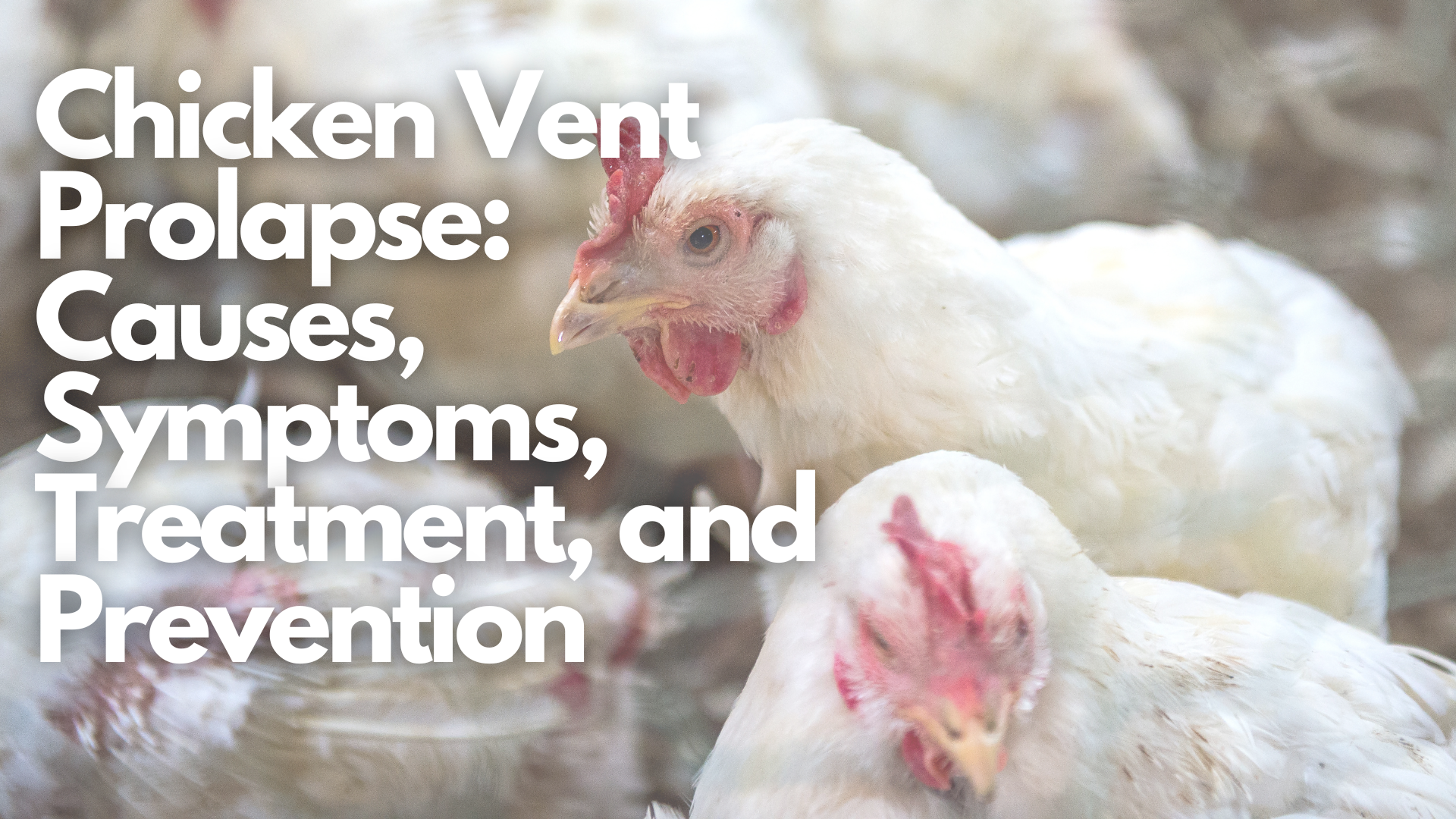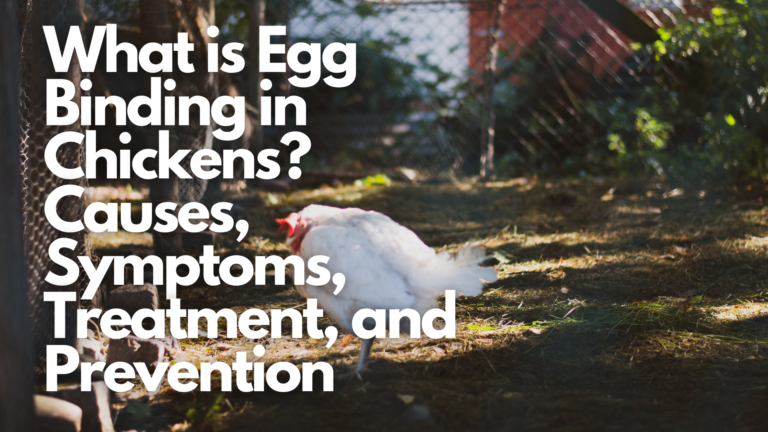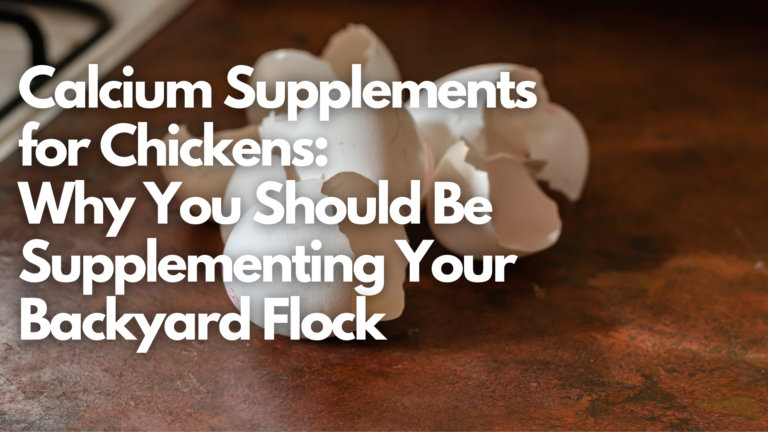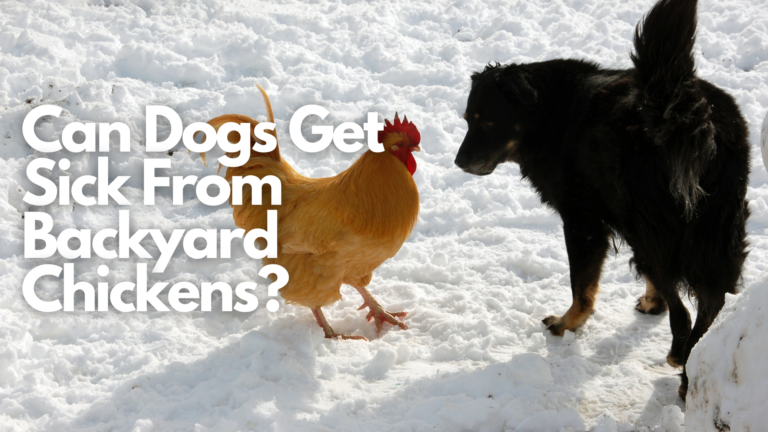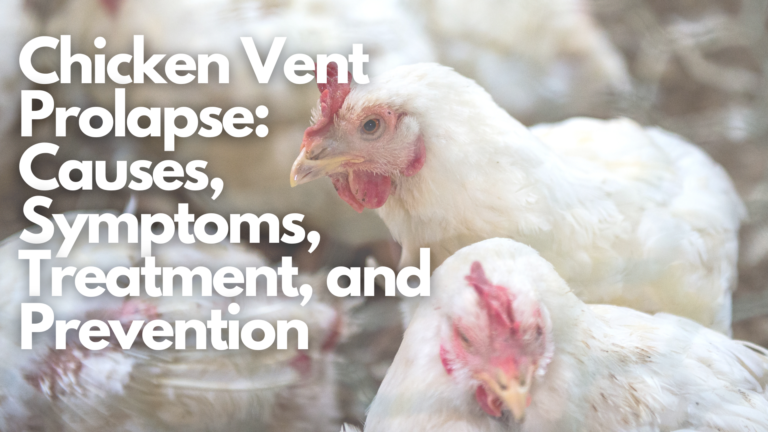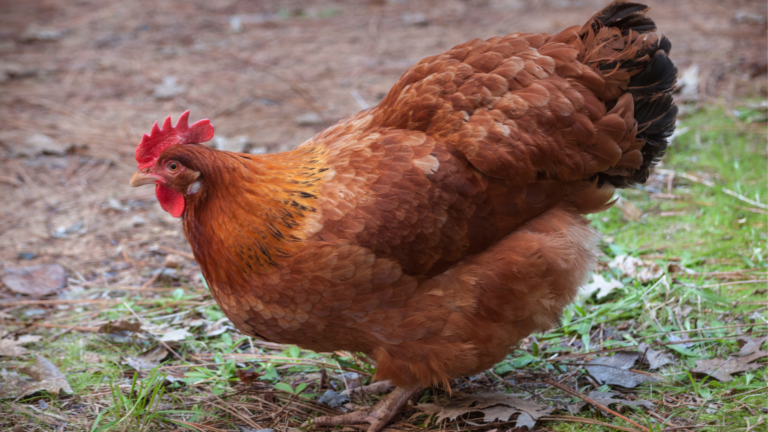Chicken vent prolapse, also known as cloacal prolapse, is a common health issue that affects poultry, particularly chickens. It occurs when the oviduct, rectum, or both protrude from the vent, which is the opening through which eggs are laid and waste is expelled.
Vent prolapse is a serious condition that requires immediate attention and treatment to prevent further complications.
What Causes Vent Prolapse in Chickens?
Several factors can contribute to chicken vent prolapse. Some of the common causes include:
- Genetic predisposition: Certain breeds of chickens are more prone to cloaca prolapse due to genetic factors.
- Age: Pullets or young hens that start laying eggs at an early age may experience vent prolapse due to the strain on their reproductive system.
- Obesity: Overweight or obese chickens are at a higher risk of developing vent prolapse due to the added pressure on their internal organs.
- Poor diet: Inadequate nutrition, including a lack of calcium or excessive protein in the diet, can weaken the muscles and tissues around the vent, increasing the risk of prolapse.
- Egg size and quality: Laying large or misshapen eggs can put strain on the reproductive tract, leading to vent prolapse.
- Egg binding: When an egg becomes stuck in the oviduct, it can cause the vent to prolapse as the hen strains to lay the egg. An eggbound chicken should be attended to immediately as this can be fatal.
What are the Symptoms of Chicken Vent Prolapse?
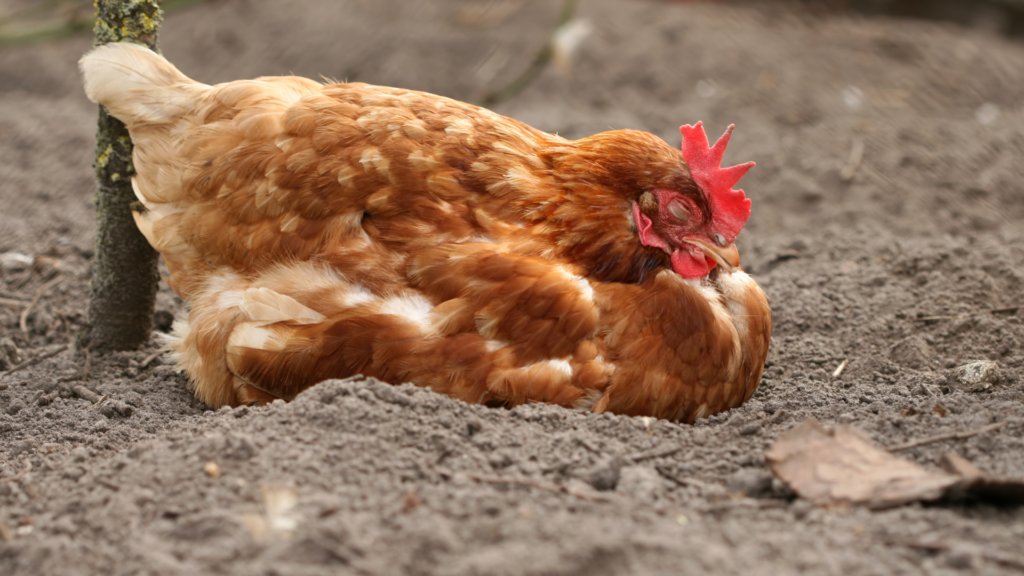
Recognizing the symptoms of vent prolapse is crucial for early intervention. Some common signs to watch out for include:
- Red, swollen, or protruding tissue from the vent: This is the most apparent symptom, with the oviduct or rectum sticking out of the vent.
- Bleeding: The exposed tissue may be prone to bleeding, which can lead to further complications if left untreated.
- Agitation and discomfort: Chickens with vent prolapse may exhibit signs of distress, including agitation, difficulty walking, and reluctance to roost.
- Decreased egg production: Affected hens may lay fewer eggs or stop laying altogether due to the discomfort and strain on their reproductive system.
- Decreased appetite: Chicken keepers may notice their chicken eating less or not at all.
What are the Treatment Options for a Prolapsed Chicken Vent?
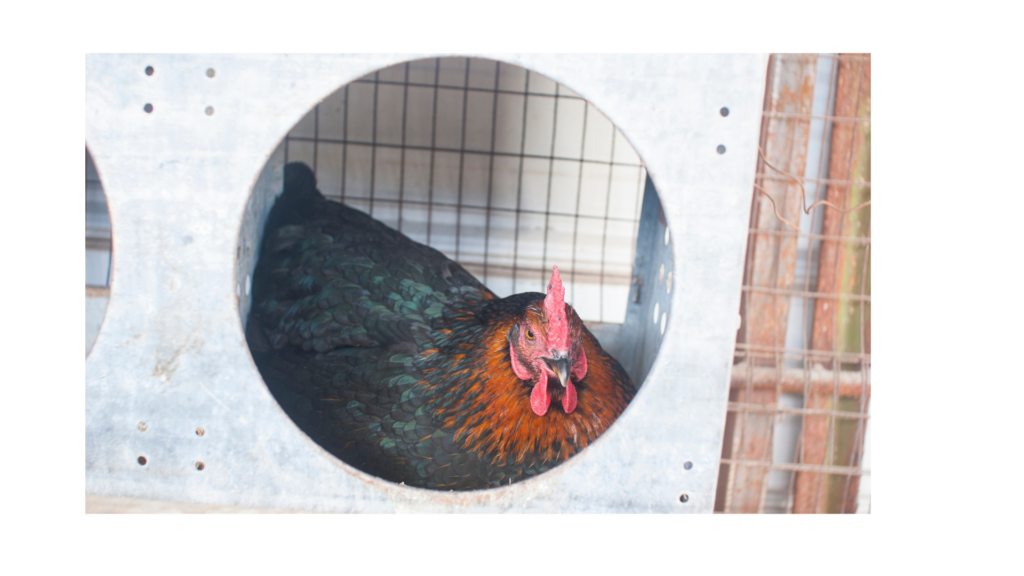
Prompt treatment is crucial to prevent complications and promote the hen’s recovery. Here are some treatment options for chicken vent prolapse:
- Isolate and clean the affected hen: Isolate the chicken from the rest of the flock and place in a quiet, clean, and comfortable environment to minimize stress. Clean the prolapsed vent gently with warm water and apply a mild antiseptic solution.
- Manual reinsertion: Wearing disposable gloves, carefully push the prolapsed tissue back into the vent. Lubricating the tissue with a water-soluble lubricant can aid in reinsertion. However, exercise caution to avoid damaging the tissue.
- Supportive care: Provide the hen with a balanced diet rich in calcium and other essential nutrients and electrolytes to promote healing and strengthen the reproductive tract. Ensure easy access to fresh water, as dehydration can exacerbate the condition.
- Medications: Your veterinarian may prescribe topical creams or ointments to reduce inflammation and promote tissue healing. Antibiotics or oral anti-inflammatory medications may also be administered to prevent infections.
- Surgical intervention: In severe cases or if the prolapse recurs despite conservative measures, surgical intervention may be necessary. This is typically performed by a veterinarian and involves stitching the prolapsed tissue back into place.
How to Prevent Chicken Vent Prolapse
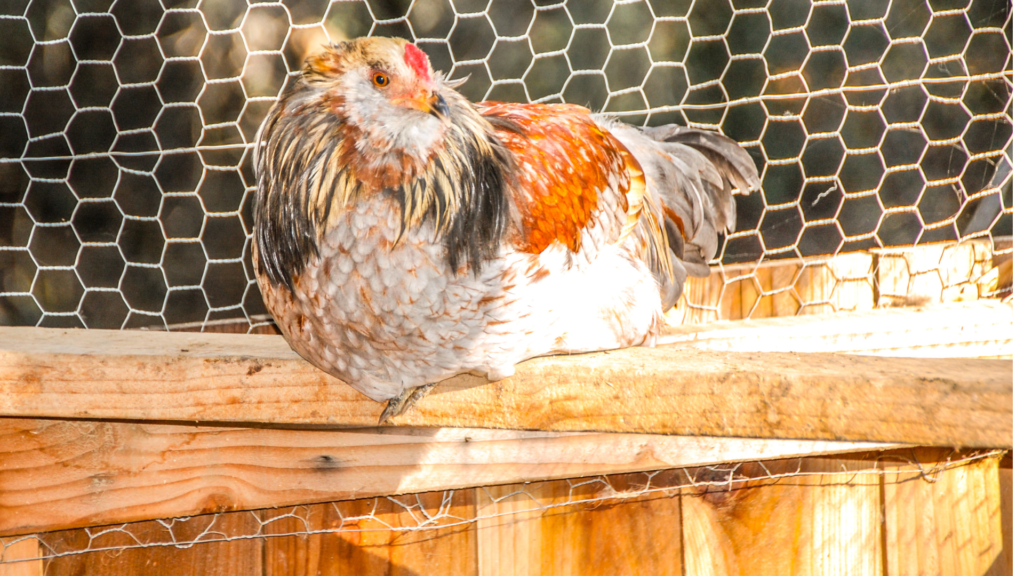
Preventing chicken vent prolapse involves implementing several preventive measures:
Control Weight
Controlling the weight of your chickens is essential to prevent vent prolapse. Both obesity and underweight conditions can contribute to the development of this condition. Maintaining a healthy body condition is crucial, and regular monitoring of your chickens’ weight can help achieve this.
Obesity can exert excessive pressure on the internal organs, including the reproductive system, making the vent more susceptible to prolapse. On the other hand, underweight chickens may lack the necessary muscle and tissue strength to support the reproductive tract adequately. Consult with a poultry expert or veterinarian to determine the appropriate weight range for your specific chicken breeds and adjust their diet and feeding routine accordingly.
Proper Housing and Nest Boxes
Creating a suitable housing environment for your chickens is vital for their overall health, including reproductive health. Your chicken coop should be clean, well-ventilated, and spacious enough to allow chickens to move around comfortably. Adequate space ensures that they are not cramped, reducing the chances of accidental injury or strain on the reproductive system. Pay special attention to the nesting boxes, as these are the areas where chickens lay their eggs.
Ensure that the nesting boxes are appropriately sized, lined with clean bedding material, and comfortable for the hens. Comfortable nesting boxes minimize stress and pressure on the vent while the hens are laying eggs.
Frequent Egg Collection
Frequent egg collection is essential to prevent chickens from sitting on the eggs for extended periods. When hens sit on eggs for too long, it can strain the reproductive tract and increase the likelihood of vent prolapse. Make it a routine to collect eggs regularly, preferably multiple times a day, to reduce the duration of egg-sitting. This practice also helps to maintain egg hygiene and reduces the risk of egg breakage, which can further contribute to vent prolapse.
Avoid Excessive Breeding
Overbreeding can place excessive strain on a hen’s reproductive system, increasing the chances of vent prolapse. It is important to implement appropriate breeding practices and give the hens sufficient rest periods between breeding cycles. Allow the hens to recover and regain their strength before introducing them to a new breeding cycle. Overworking their reproductive system without sufficient breaks can weaken the muscles and tissues around the vent, making it more susceptible to prolapse.
Monitor Egg Size and Quality
Consistently large or misshapen eggs can indicate underlying issues that may contribute to vent prolapse. Large eggs can put additional strain on the oviduct and vent, increasing the risk of prolapse.
Misshapen eggs may result from calcium deficiencies or other nutritional imbalances. If you observe abnormalities in egg size or shape, it is advisable to consult with a poultry expert or veterinarian. They can assess the situation and guide you on appropriate dietary adjustments or other measures to improve the chickens’ reproductive health.
Provide Calcium Supplements
Calcium deficiency can weaken the muscles and tissues around the vent, making chickens more prone to vent prolapse. To support their reproductive health, it is important to provide them with sufficient calcium in their diet. Calcium-rich sources such as crushed oyster shells or commercial calcium supplements can be added to their feed.
These supplements help ensure that the hens have an adequate supply of calcium for egg laying and overall reproductive system health. Consult with a poultry expert or veterinarian to determine the appropriate dosage and administration method for calcium supplements.
Regular Health Checks
Conducting regular health checks on your flock is crucial for identifying any signs of vent prolapse or other abnormalities at an early stage. During these health checks, carefully examine the vent area for any redness, swelling, or protruding tissue.
Early detection of vent prolapse allows for timely intervention and increases the chances of successful treatment. Additionally, these health checks provide an opportunity
Frequently Asked Questions About Vent Prolapse in Hens
Can chicken vent prolapse be fatal?
If left untreated, chicken vent prolapse can lead to severe complications and even death. Prolapsed tissue is prone to bleeding, infection, and damage, and the hen may experience significant discomfort and distress. It is important to seek veterinary attention as soon as possible to prevent complications and promote the hen’s recovery.
Can vent prolapse recur in chickens?
Yes, vent prolapse can recur in chickens, especially if the underlying causes and risk factors are not addressed. It is crucial to identify and address the factors contributing to the prolapse, such as obesity, poor diet, or genetic predisposition. Implementing preventive measures and regular monitoring can help reduce the chances of vent prolapse recurrence.
Can I prevent vent prolapse through breeding selection?
Breeding selection can play a role in reducing the occurrence of vent prolapse. By selecting breeding stock with a lower genetic predisposition to vent prolapse and considering factors such as body structure and reproductive health, you can potentially reduce the likelihood of the condition in future generations. Consulting with experienced poultry breeders or veterinarians can provide guidance on appropriate breeding practices to minimize the risk of vent prolapse.
Is vent prolapse contagious among chickens?
No, vent prolapse is not contagious among chickens. It is not caused by a contagious disease or infection. However, certain factors contributing to vent prolapse, such as poor nutrition or housing conditions, may affect multiple chickens in a flock. It is important to address these underlying factors to prevent vent prolapse in multiple birds.
Is vent prolapse more common in specific chicken breeds?
Vent prolapse can occur in any chicken breed, but there may be certain breeds or genetic lines that are more prone to the condition. Some breeds may have genetic predispositions that make them more susceptible to weak muscle tone or other factors contributing to vent prolapse. It is important to research and be aware of any breed-specific tendencies and take appropriate preventive measures to minimize the risk in susceptible breeds.
Can stress contribute to vent prolapse in chickens?
Yes, stress can contribute to vent prolapse in chickens. Stressors such as overcrowding, excessive noise, sudden environmental changes, or disturbances in the flock dynamics can weaken the immune system and affect overall health, making chickens more susceptible to health issues like vent prolapse. Minimizing stress in the chickens’ environment by providing appropriate housing, maintaining a consistent routine, and avoiding unnecessary disturbances can help reduce the risk of vent prolapse.
Can male chickens (roosters) experience vent prolapse?
While vent prolapse is more commonly observed in hens, male chickens (roosters) can also experience vent prolapse, although it is less frequent. The causes and risk factors for vent prolapse in roosters are similar to those in hens. If a rooster exhibits signs of vent prolapse, it is important to seek veterinary attention for proper diagnosis and treatment.
Can vent prolapse affect a chicken’s ability to lay eggs?
Yes, vent prolapse can affect a chicken’s ability to lay eggs. The prolapsed tissue can cause discomfort and may interfere with the normal function of the reproductive system. Affected hens may lay fewer eggs or even stop laying altogether due to the strain on their reproductive system. Timely treatment and care are important to minimize the impact on egg production and promote the hen’s overall well-being.
Vent Prolapse in Backyard Chickens: Serious But Treatable
Chicken vent prolapse is a significant concern for poultry owners, but with proper understanding, proactive measures, and timely intervention, it can be effectively managed and prevented.
Recognizing the causes, symptoms, treatment options, and preventive strategies outlined in this article will help you safeguard your chickens’ reproductive health and promote their overall well-being. Remember, the guidance of a veterinarian should be sought when dealing with vent prolapse to ensure appropriate treatment and care for your chickens.
